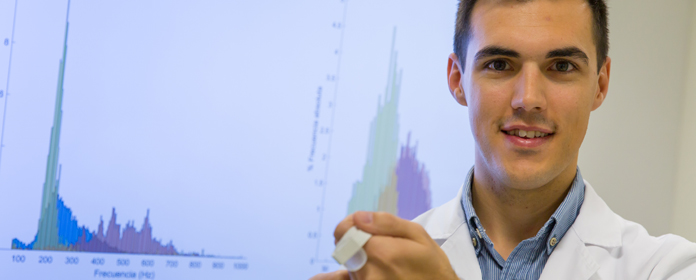News
LATEST NEWS AND EVENTS FROM THE SCHOOL OF ENGINEERING
Wearable device for monitoring patients with voice problems
The engineer Marcos Llorente has designed, in the first thesis of the Laboratiorio de Ingeniería Médica, a mechanism that adapts to the throat and allows the detection of inefficient phonatory patterns.

Marcos Llorente recently defended the first Engineering thesis within the PhD in Applied Medical Research at School of Medicine, a research that has been developed for the first time in the Medical Engineering Laboratory.
This is a doctoral dissertation that combines Engineering and Otolaryngology, and has been directed by Dr. Secundino Fernández, Dean of the School, and co-directed by the professor of Tecnun Adam Podhorski. "The aim of goal was to make it possible to monitor patients outside the hospital environment, and to have objective data on the use and characteristics of the voice for diagnostic and therapeutic purposes," explains Llorente.
For this purpose, this engineer, former student of Tecnunhas developed a wearable device that is placed on the throat and records and measures the main parameters of the voice (fundamental frequency and relative intensity), as well as the time of use of the voice, doing all the processing internally. "This is possible thanks to an accelerometer placed on the skin in the lower part of the larynx that records the vibrations generated by the vocal cords. This information is processed by a low-power microcontroller that is responsible for obtaining the value of the parameters of interest. The low power consumption of this device makes it possible to record for weeks without the need for intervention by the Username", details the researcher.
In this way, the device allows the detection of inefficient phonatory patterns (voice deficiencies or lesions) or at risk of development of organic lesions, while allowing the monitoring of behavioral modification after having followed logopedic, pharmacological or surgical treatments.
